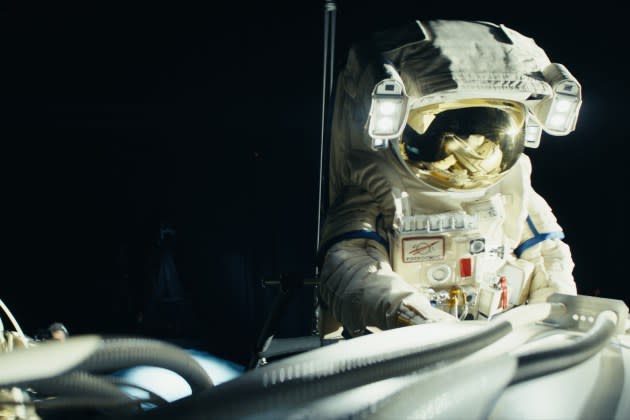How Apple TV+ Space Series ‘Constellation’ Pulled Off Those Zero Gravity Scenes

Some imperfect iPhone video shot by retired NASA astronaut Scott Kelly while he was commander of the International Space Station was the primary source of inspiration behind the visual style of the space-set scenes in Apple TV+’s “Constellation.”
As the sci-fi series begins, astronaut Jo, played by Noomi Rapace, survives a disaster at the ISS and returns to Earth to find that things are not the same. Kelly was a key adviser on the ambitious production.
More from Variety
Director of photography Markus Förderer (“Red Notice”) relates that after seeing Kelly’s video, the team aimed to “replicate” as close as possible “that feel of a camera operator floating in zero gravity but it being handheld and grounded — and not like it was shot [on] a crane.” This was achieved, he says, by switching filming techniques, as magicians do to sell their illusions, with teamwork from multiple departments, including production design and visual effects.
For live-action filming, an intricate ISS set was built in sections on the largest stages at Studio Babelsberg outside of Berlin, led by production designer Andy Nicholson, who was Oscar-nominated for Alfonso Cuarón’s “Gravity.” Lighting controlled by dimmer boards was built into these sets.
A second proxy set was built to allow the actors, stunt performers and camera team to rehearse. Kelly provided details, such as advising that the actors should avoid the “Superman pose” in the zero-G set scenes. “They float as much as they can upright. So we tried to be truthful to that,” Förderer says, noting that the actors, particularly Rapace, trained for several weeks when filming on a wire. “To sell the ease of being weightless is actually quite hard,” he adds.
Förderer wanted to employ a camera that could be stripped down for tight spaces and that also could shoot very high-quality anamorphic images. To do this, he chose the Red V-Raptor large-format cameras paired with Panavision T-Series anamorphic lenses. Filmed elements for wide shots involved various approaches, including use of a Steadicam or gimbal, and in other instances, handheld.
To film inside the ISS set, he also employed FPV (first person view) drones, which had to be flown through the tight set in an extremely precise manner. “This was the most authentic way to capture zero gravity, and we used it over all episodes for POV shots and establishing shots.”
For shots on the exterior of the ISS, the stage was blacked out, and the crew wore black and kept at a distance, while an LED light source mimicked the sun. “Our fake sunlight is nowhere near as bright as the sun — but I could expose for it to make it feel bright and harsh — and the sun was on a crane, so we could constantly get a sensation that the space station is actually moving quite fast around the orbit.” Reflections were also created to provide the sense that the Earth was moving.
“Reflections were such a big deal for us because we’re dealing in multiple realities,” Förderer says. “We talked constantly about how we can give a sense of presence of another Jo or another reality, so whenever we could, we used reflections to give a hint there’s more than what we see.”
Best of Variety
Sign up for Variety’s Newsletter. For the latest news, follow us on Facebook, Twitter, and Instagram.

